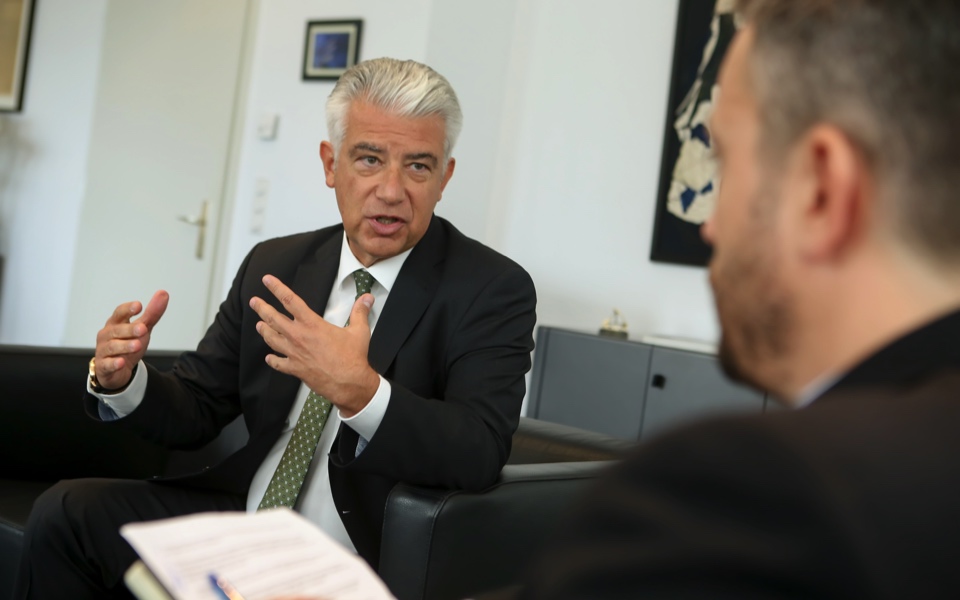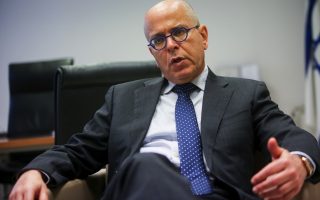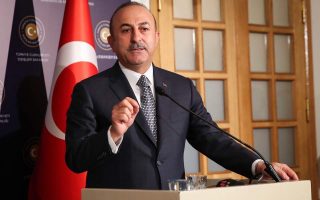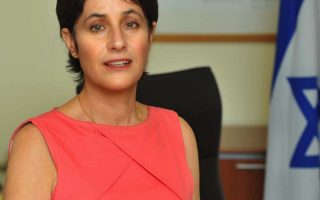Athens and Berlin on the same page on migration

Berlin shares Athens’ basic positions on the migration issue, Germany’s new Ambassador to Greece Ernst Reichel has said in an interview with Kathimerini. Reichel says that given the bloc’s failure to reach a consensus on the issue, the German government favors establishing a critical mass of European Union member-states willing to create a relocation system. The top German diplomat in Greece calls for closer cooperation between EU governments to deal with geopolitical challenges, while on the issue of reducing Greek primary surplus targets, he says it would make sense to hold the conversation “at a later point.”
How can the Greek-German relationship evolve under the new circumstances?
Germany and Greece already had a very close relationship before the crisis, and during the crisis it hasn’t always been easy. I feel fortunate that now maybe I have arrived at a moment when one can broaden the perspective and one can open oneself to the whole range of the very close relationship we have always had. Be it the 450,000 Greeks who live in Germany, science, culture or of course the economy, which is the number one question here in Greece. The idea is to move away from the fixation on fiscal targets and establish a much broader view of how to balance our relationship.
These new circumstances involve challenges like the migration/refugee issue. How can migrants and refugees be settled around Europe or sent back to their country of origin?
My government very much agrees with the basic positions that Greece has in this. We also believe that there needs to be a revision of the Dublin system and in a way that takes more account of the specific needs and difficulties of countries that are at the periphery of the EU. We fully understand and we know from experience that the people who arrive here on the islands or in other parts of Southern Europe ultimately tend to show up also in Germany. Therefore it is clear that we have to be better at the moment where the people actually arrive within the EU. Relocation of migrants and refugees is very disputed in the EU. Germany has been the prime advocate of this, but unfortunately we have not been successful, and I am not very optimistic that we will achieve a full consensus in the EU about a relocation system. But what we can do and are trying to do is to establish a critical mass of EU member-states which are willing to create such a relocation scheme among themselves.
Greece stands on the crossroads of converging crises. What is the German understanding of it?
I think, as in many issues, the best answer we can find lies in European cohesion. In a situation where we are surrounded with crises, with the questioning of or disregard for the values that have been commonplace for a long time, in a situation where we have internal insecurity about what binds our societies together – in such a situation, I think we have no choice other than to – even more than in the past – be coherent among us Europeans, to show solidarity among us Europeans. And to not allow ourselves to be divided by external actors. Special relationships, strategic partnerships are good and well, every country has them, but number one always needs to be loyalty to the EU and European values. If we can manage to do that, then we are in a much better place to address our problems.
So this means that Europe needs to take further steps on the integration on foreign policy and defense.
That is part of the answer. Aside from that, there is the issue of in what spirit we work together and whether we have a basic understanding of solidarity. Our solidarity lies with each other and not with outside actors who are trying to split us up and who are waging an information war against us.
On the North Macedonia and Albania accession talks, do you believe that Greece alongside Germany can play a role in restarting the process?
Yes, I am convinced of that. Greece has a very important role to play. We share the conviction that we should not close the file on accession talks with North Macedonia and Albania. We need to keep this discussion alive and revert to it as soon as we can. Germany thinks that it was very unfortunate that the EU could not come to a positive decision in the last summit. Generally speaking, all of us in the EU should try to steer clear of putting internal considerations or bilateral issues we might have first and above our credibility, or our strategic interests.
How can Europe protect the sovereign rights of its members? In the case of Cyprus, Turkey is violating its continental shelf.
We are very clear that we disagree with what Turkey is doing in the exclusive economic zone of Cyprus, and we are very much in favor of a common European response to that. The EU has just agreed sanctions in reaction to Turkey’s actions, and we supported this. The opinion Greece holds is very important to us in determining what we should be doing. Of course we have many issues to discuss with Turkey – this is one of them – and we need to put them into an overall perspective.
What stance should Europe take vis-a-vis countries like Russia or China?
I think the realistic way of dealing with such large countries that we have difficulties with is to maintain dialogue, but also make clear what our positions are, and set limits. It makes sense to offer such countries a conversation and point out where we ask them to adapt their policies. In such a conversation, it is important to name things by their name, to point out violations of international law, of human rights, or where they are interfering in our internal affairs, for instance by organized, state-sponsored disinformation activity. My former post was in Ukraine, and Russia’s occupation of Crimea and its involvement in the fighting in the east of Ukraine is an obvious example of an open, large-scale and continuing violation of international law. Germany and France are heavily engaged in the effort to resolve this conflict.
In terms of investment, what are German firms interested in?
When new privatizations come up, such as an additional 30 percent share in Eleftherios Venizelos Airport, that is something that is of interest to German investors. Tourism evidently is a booming industry in Greece that still has a lot of potential – more than 4 million German tourists visited Greece last year. I believe the change that has taken place in Greece is maybe a little bit too fresh for investors to gain confidence and adapt to the new reality and conditions that exist – they need some time.
What about new technologies and startups?
My embassy is organizing an Innovation Forum here in Athens in a few days. It brings together German firms with innovative companies here and showcases best practices and good examples. Greece has some really impressive firms which need to be better known and understood abroad. Then we have another conference that our leaders, Prime Minister Kyriakos Mitsotakis and Chancellor Angela Merkel have agreed upon in Berlin, at the beginning of next year, on “Green Growth.” The culmination of this sequence of high-profile events will then be the Thessaloniki International Fair, where Germany will be the “honored country.” My embassy and a lot of people in Germany are already working very hard to put everything in motion.
Is there a German proposal as to how Greece and Germany can cooperate on defense?
Germany of course is a very willing partner in the development of the defense sector here in Greece; we are NATO allies and so there is no obstacle for German providers to make offers. There is also room for closer cooperation between the governments. And maybe with the political change that has taken place here, there is a better foundation for better cooperation. We are in early days here with the new situation that is evolving, but I think the willingness in Germany to assist and cooperate is certainly there.
There is discussion here about the fiscal targets of Greece – in order to boost growth again. The main problems are high taxation and high primary surpluses. Is the re-evaluation of these targets – say next year – something feasible?
We are listening very carefully to what the Greek government is saying about this: It has been saying that they intend to use the fiscal space that is available under the prevailing agreement to ease the tax burden on citizens and enterprises. I do agree that the tax burden is really heavy and it is an obstacle to economic growth, but at this point in time, the question of easing the primary surplus requirement is not really on the agenda. The current agreement was very hard and painful to reach, so there is a natural tendency to not want to reopen it so early. Greece needs to win more confidence of the lenders before it can address such an issue as the change of the primary surplus targets successfully. This can be done by taking the economic reform decisions the new government has announced it will take, but this will require some time. Therefore, my sense is that we should be having this conversation maybe at a later point.
How can Germany and Greece further cooperate in culture, in the broader sense?
One of the major projects that we are pursuing is the creation of a Greek-German youth office which will organize youth exchange on a more intensive basis than in the past. This is a project that we had already put on track under the previous government – the agreement has been signed, but we need to ratify, sign follow-up agreements and then actually set up the office so that it can start working. Another thing is the annual Greek-German assembly (which just took place in Bavaria this year), where we are trying to establish ties and partnerships between municipalities in both countries. Because this is also where the heart of the German economy actually lies, in small to medium-sized enterprises across the country. Next year, we will celebrate the 10th anniversary of the assembly in Athens. Also, we now have a chance to work much more in vocational training. That is something that we in Germany consider a success story of ours, and it is quite clear that the new government is very interested in this model. It steps up the quality and relevance of non-academic education. Another project: We want to re-establish and refurbish the overarching cultural agreement that exists between the two countries and which dates from the middle of the 20th century. This agreement does not reflect modern reality any longer. Finally, science is a great area of potential. There have been very close ties for many decades. I keep running into professors here who speak excellent German and have studied in Germany, have taught in Germany. And yet I think there is much more we can do there, building on this tradition. Greece has a lot of high quality to offer.





